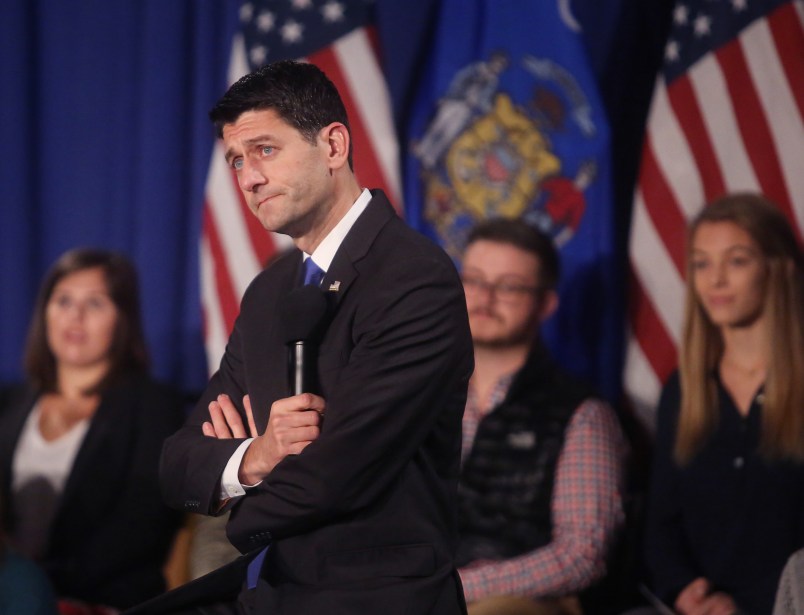It looks as though the House of Representatives will easily hold its majority after Tuesday and the Republican Party will win the White House after eight years of President Barack Obama.
But when House Speaker Paul Ryan returns to Washington next week, the party he has long campaigned for, the ideals he fought for and the conservatism he said he believed in are no longer the same.
The 46-year-old Paul Ryan started the year as the reluctant, yet respected speaker who’d come to his new post with a realistic expectation that his vision and brand of low-tax, free-trade conservatism would be embraced by a soon-to-be-named Republican nominee for president. Instead, Donald Trump won the Republican presidential nomination.
From the beginning, the arranged marriage between Trump and Ryan was peculiar, awkward and forced. It took an adjudicated meeting with GOP Chairman Reince Priebus when they finally got int a room together.
What the last year has revealed about Ryan– a lauded, former VP nominee, wunderkind and rising star– is that his own trajectory and that of his party may be changed forever.
Once viewed as the future of the GOP, Ryan looks now like he was left behind.
From the beginning, Ryan approached Trump with skepticism, declining to endorse him right away and uttering a phrase that would come back to haunt him: “I’m just not there yet.”
There was reason for Ryan to pause. Ryan was a policy wonk, Trump was a showman who had discovered he could peddle Republican ideas and garner big crowds. Trump barely understood the vocabulary of issues that Republicans had carefully crafted for decades. Ryan was often the first to dig in to complexities. Ryan was unapologetically anti-abortion. Trump had waffled on the issue before insinuating in an interview that women who obtained abortions should face punishment (an idea widely rebuked by anti-abortion activists.) Trump rejected trade agreements that Ryan touted and repeated stereotypes of immigrants and African-Americans that Ryan had worked with his party to toss aside. Trump wasn’t, in other words, the Republican that Ryan had imagined when he’d dreamed of a Republican nominee to build his agenda around.
When Trump attacked a federal judge for his “Mexican” heritage, Ryan called it “the textbook definition of a racist comment.” Ryan spoke up again and again when Trump didn’t distance himself forcefully enough from David Duke, when Trump offered up a Muslim ban as a solution to terrorism, when Trump attacked a Gold Star family.
Trump even paused at endorsing Ryan in his primary election.
“I’m just not quite there yet,” Trump said.
When a tape surfaced of Trump saying he grabbed women by the p***y, it was the moment where Ryan came closest to walking away. He uninvited Trump to their first joint appearance in Wisconsin. And yet, Ryan stuck around in the end.
On Sunday, Ryan released an op-ed making the case for a Republican Senate, a Republican House and Republican White House.
He only mentioned Trump’s name once and it was in passing.
“Only Republicans are offering a better way,” he said. “A unified Republican government will dedicate itself to reclaiming our founding principles and solving the country’s problems.”
But, the founding principles Ryan is talking about and the principles that won Trump this election are vastly different.
It could be Ryan’s vision of those principles are simply no longer relevant.







Here we go again! When will we ever learn?
Lauren, good article----I can’t believe that you are up and writing at 5 a.m. after such a hard night! What a tiger!
I predict Republicans will no longer care about either the deficit nor the cost of healthcare. And foreign wars will be fine as will short sleeves on the First Lady.
When you say short sleeves, you mean only short sleeves, right?
Proof positive that conservatives don’t give a damn about the national debt, now at $19T: according to some estimates, Trump’s wall will cost up to $25B.
Proof positive that conservatives don’t give a damn about their “GOP family values”: they elected Trump the pussy-grabber, the guy who doesn’t pay his bills.